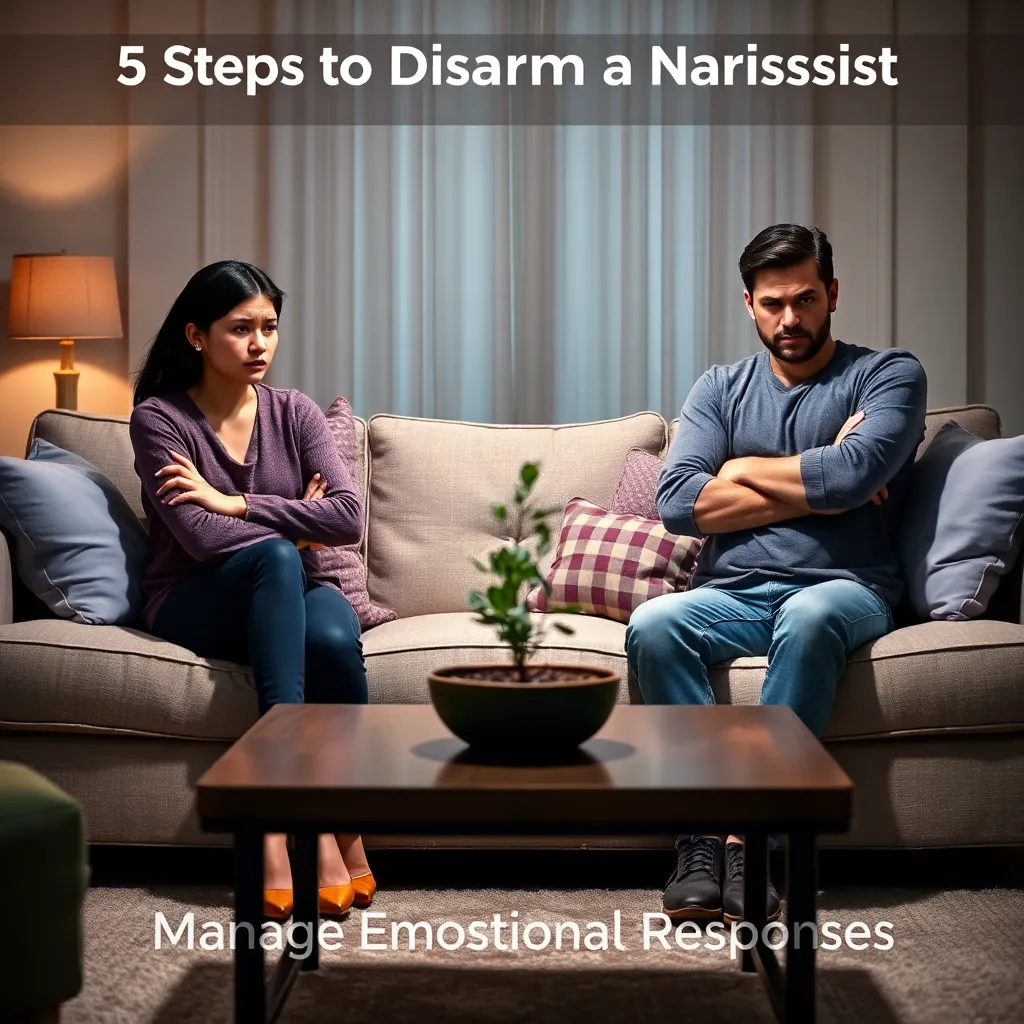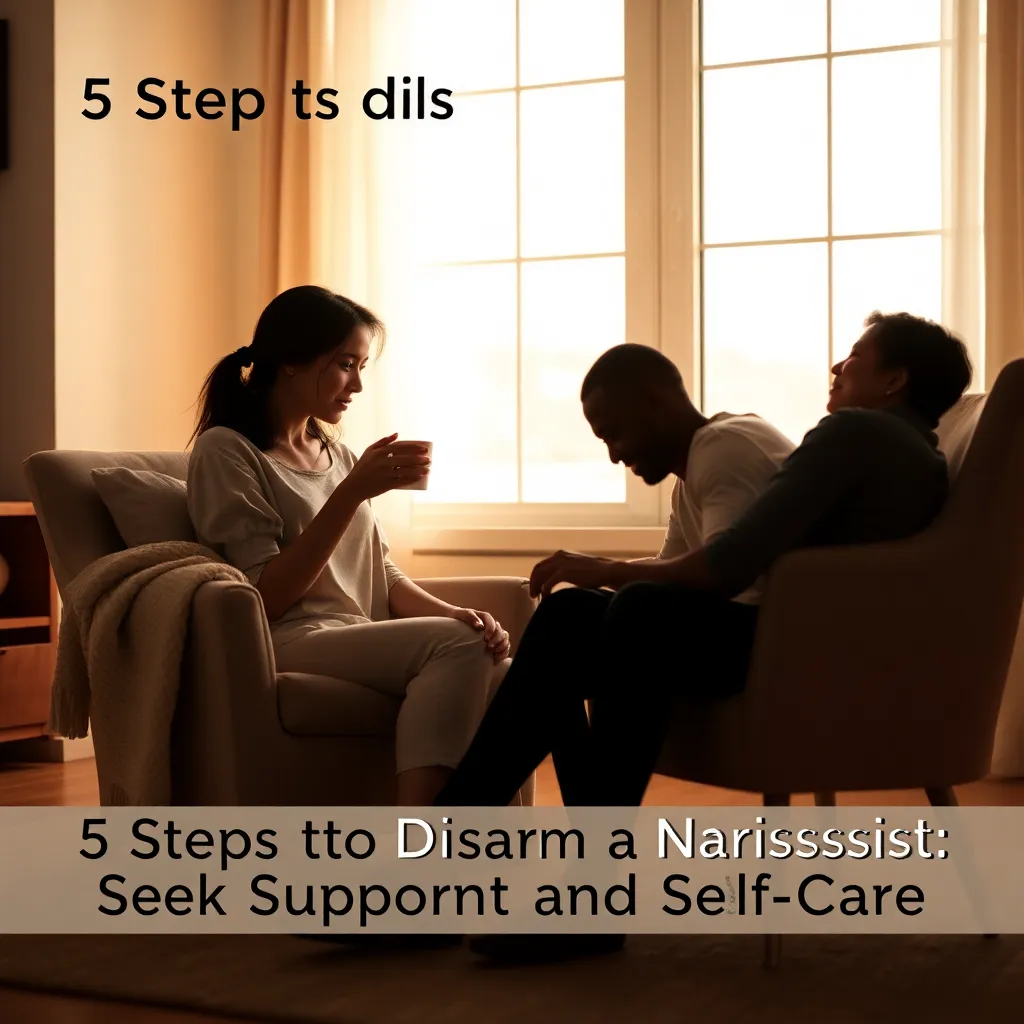Navigating relationships with a narcissist can feel like walking through a minefield, where every step might trigger an unexpected explosion. You’re not alone in feeling overwhelmed or drained, and it’s important to recognize that your experience is valid and deserving of attention. Understanding how to protect yourself from the unpredictable nature of a narcissist’s wrath is crucial not only for your emotional well-being but also for maintaining your sense of self and peace of mind. This article is here to guide you through practical strategies, empowering you to reclaim your power and foster healthier boundaries.
In the following sections, we will explore five actionable steps designed to help you disarm the narcissist in your life. These are not about engaging in conflict but focusing on creating a space where you can feel secure and respected. By equipping yourself with these tools, you can transform your approach to challenging interactions, ultimately finding more balance and tranquility. Through empathetic insights and expert advice, you’ll gain the confidence to navigate these complex dynamics with grace and resilience.
As you journey through this article, you’ll discover that protecting yourself is not only possible but also liberating. Each step is crafted with care to support you in building a shield against the emotional turbulence that often accompanies narcissistic behavior. We aim to provide not just tips, but a sense of solidarity and hope, reminding you that your well-being matters deeply. Let’s embark on this path together, towards a more empowered and peaceful you.
1. Recognize Narcissistic Behaviors

Understanding the signs of narcissism is the first step to protecting yourself from its impact. A narcissist often exhibits a pattern of grandiosity, a need for excessive admiration, and a lack of empathy for others.
Imagine being in a relationship where your partner regularly dismisses your feelings, making you feel invisible. This behavior is a classic sign of narcissism, where the partner’s self-importance overshadows the emotional needs of others.
Experts suggest looking out for behaviors such as manipulation and frequent gaslighting, which can destabilize your sense of reality. In these situations, it’s crucial to trust your instincts and recognize when something feels off.
By becoming aware of these behaviors, you equip yourself with the knowledge to set boundaries and protect your well-being. Recognizing narcissistic traits is not about labeling someone but about understanding how to navigate the relationship healthily.
2. Set Firm Personal Boundaries

Once you have recognized the signs of narcissistic behaviors, it’s crucial to set firm personal boundaries to protect your well-being. Consider a scenario where a friend constantly criticizes your choices, leaving you feeling drained and belittled. By establishing clear limits on what behavior you will or will not accept, you create a safe space for yourself. This empowers you to reclaim control over your emotional responses and interactions.
Boundaries act as a protective shield, reminding both you and the narcissist of your individual limits. For instance, if a partner habitually interrupts your personal time with incessant demands, calmly express that certain hours are reserved for yourself. Make it known that you will not engage in discussions during those times, reinforcing your autonomy. Such boundaries are crucial not only for your mental health but also for maintaining a balanced relationship dynamic.
Communicate your boundaries clearly and consistently to ensure they are understood and respected. Use “I” statements to express how certain actions affect you, such as, “I feel overwhelmed when my space is invaded without notice.” This approach shifts the focus to your feelings rather than the other person’s actions, reducing their defensiveness. Moreover, consistency in upholding these boundaries is key to reinforcing their importance.
Remember that boundaries are not about controlling others but about protecting yourself. They serve as a reminder that your needs and feelings are valid and deserve consideration. By maintaining these boundaries, you cultivate a healthier environment for yourself and potentially pave the way for more respectful interactions. Ultimately, the strength of your boundaries reflects the strength of your self-respect and emotional well-being.
3. Communicate with Confidence

After establishing boundaries, it’s crucial to communicate with confidence when dealing with a narcissist. Imagine you’re in a meeting where every word seems to be twisted; maintaining a calm demeanor and speaking clearly can prevent misunderstandings and power plays.
Practicing assertive communication ensures that your voice is heard without being overshadowed by their dominating presence. For instance, using “I” statements like “I feel” or “I need” can help express your feelings directly, making it harder for the narcissist to manipulate your words.
Experts suggest that maintaining a steady tone and eye contact can greatly enhance your self-assured presence. This approach not only communicates strength but also signals that you won’t be easily swayed by emotional manipulation.
Sometimes, it might be tempting to mirror the narcissist’s aggression, but resisting this urge is crucial. Instead, responding calmly and confidently can disarm their attempts to provoke you, shifting the dynamic in your favor.
By consistently communicating with confidence, you establish a pattern of respect and assertiveness that can protect you from emotional harm. As you integrate these strategies into your interactions, you’ll find that standing your ground becomes second nature, leading to healthier relationships.
4. Manage Emotional Responses

In the complex dance with a narcissist, learning to manage your emotional responses is crucial. A narcissist often thrives on emotional chaos, using your reactions to fuel their need for control and validation. Picture a scenario where you find yourself feeling overwhelmed and defensive during a heated conversation. Instead of engaging, take a deep breath and remind yourself that your emotions are valid but don’t need to dictate your responses.
Experts suggest that maintaining emotional neutrality can be a game-changer. By practicing techniques such as mindfulness or deep breathing, you can create a buffer between your emotions and your actions. Imagine a situation where your partner criticizes you in a way designed to provoke. In this moment, visualize yourself as a calm, steady rock, unmoved by the emotional storm trying to engulf you.
Another effective strategy is to focus on what you can control—your response. Instead of reacting emotionally, shift your attention to constructive solutions or end the interaction gracefully. By doing so, you disrupt the cycle of escalation that a narcissist often counts on to regain control. Remember, your power lies in your ability to choose a response that aligns with your wellbeing.
Ultimately, mastering your emotional responses not only disarms the narcissist but also strengthens your own emotional resilience. By consistently opting for calm and measured reactions, you deprive them of the drama they seek. This approach empowers you to maintain your peace and assert your boundaries effectively, creating a healthier dynamic or protecting yourself from further harm.
5. Seek Support and Self-Care

Understanding your need for support is crucial when dealing with a narcissist. Connecting with friends or family who can offer a listening ear can be a source of immense strength.
Consider seeking professional guidance from a therapist who specializes in narcissistic behavior. They can provide you with strategies tailored to your situation, helping you navigate these tumultuous waters.
Engaging in self-care activities is not just a luxury; it’s a necessity. Whether it’s through yoga, meditation, or simply taking a walk in nature, these practices can help you regain a sense of balance and peace.
Keep in mind that setting aside time for yourself is not selfish but rather an act of self-preservation. By prioritizing your own well-being, you build resilience against the emotional toll that a narcissist can inflict.
Ultimately, seeking support and practicing self-care empower you to set boundaries that are essential for your emotional health. Remember, you are not alone in this journey, and reaching out is a sign of strength, not weakness.
Conclusion: Creating Beautiful Outdoor Spaces
In navigating relationships with a narcissist, understanding and implementing effective strategies is crucial. First, setting firm boundaries helps protect your emotional well-being. Second, maintaining emotional distance allows you to respond calmly rather than react impulsively. Third, practicing assertive communication ensures your needs are clearly expressed without escalating conflict. Fourth, cultivating self-awareness empowers you to recognize manipulation and maintain your self-esteem. Lastly, seeking external support provides the guidance and reinforcement needed to uphold these strategies.
As an actionable next step, take a moment today to identify one boundary you can reinforce in your interactions, aiming to safeguard your peace and mental health.
Remember, every step you take towards managing these challenging interactions brings you closer to healthier relationships. Bookmark this article now to keep these vital strategies at your fingertips for future reference.
Looking ahead, by equipping yourself with these tools, you lay the groundwork for thriving, balanced relationships. Embrace this journey with confidence, knowing that you are capable of fostering connections built on respect and mutual understanding. Let this be your guide to transforming your relational landscape for the better.
